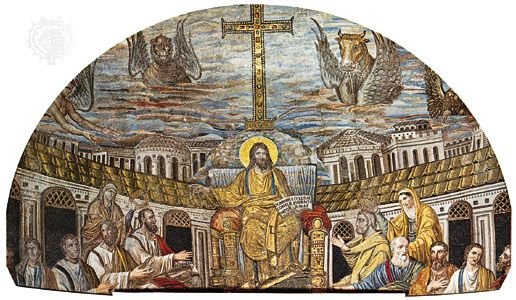In the city of Pergamum, pagan gods and Roman emperors were deeply honored. But , a significant person in the Bible Book of Revelation, remained faithful. He stayed true to Christ, even through death by martyrdom.
Known as a “faithful martyr,” Antipas faced a tough situation in “Satan’s seat.” This phrase refers to the city’s strong worship of idols and its hate for Christianity. His story, short in the Bible, has inspired many to stand boldly for their faith.
We don’t know much about Antipas’ life and end from the New Testament. But, early Christian stories give us more details. They show us the kind of faith that can overcome the toughest challenges and even death. So, who is Antipas in the bible? Let’s find out.
The Enigmatic Martyr of Pergamum
The only biblical mention of Antipas is in Revelation 2:13. Here, Jesus praises the church in Pergamum for staying true to Him in tough times. He mentions Pergamum as the place “where Satan’s throne is.” The passage tells us about Antipas, a “faithful martyr,” who was killed there. This short note has sparked wide discussion among scholars about Antipas’s story and role.
Antipas: A Faithful Witness Unto Death
The biblical account paints Antipas as a man who stood strong in his faith, even till death. It describes him as a “faithful martyr,” ready to die for Christ. His unbreakable faith in the face of danger, right at the heart of trouble, is admired by many.
Decoding the Biblical and Historical Clues
Pergamum was called the place of “Satan’s seat” or “Satan’s throne.” What this meant has sparked much discussion. Many think it refers to the strong presence of emperor worship and pagan cults. These things greatly threatened the early Christian group who lived in Pergamum. The phrase shows how much hardship and challenge the Christians in Pergamum endured. It also highlights the severe persecution against people like Antipas there.
The Symbolic Significance of “Satan’s Seat”
Antipas has limited mention in the Bible. But, early Christian stories and myths add more about his life and martyrdom. These tales say Antipas was made the bishop of Pergamum by the apostle John. They also mention his sad death during the rule of either Nero or Domitian. They say he was put inside a brazen bull-shaped altar and burned alive.
who is antipas in the bible
Antipas: A Bishop Martyred for His Faith
Antipas led the church in Pergamum during the leaving years of the 1st century AD. He found himself under persecution. The authorities told him to reject his faith and partake in emperor worship. Antipas stood firm, choosing to die rather than turn from his Christian beliefs.
The Fiery Ordeal of the Brazen Bull
Antipas’ death was a horrifying ordeal. He was sentenced to die in a brazen bull-shaped altar. This method, used by pagan officials, saw him burned to death. His brave decision not to give up his faith made him a celebrated Christian figure.
The Legacy of Antipas in Early Christianity
Antipas’ story deeply impacts the Christian faith, especially for those under persecution. His strong commitment to Christ shines through, even in death. This has made him a symbol of unshakeable faith for those who may sacrifice for their beliefs.
The tale of Antipas’ martyrdom underscores the challenges and strength of the Christian journey. It has been a steady source of inspiration across generations.
Antipas: An Inspiration for Persecuted Believers
Antipas was ready to die for his faith, a powerful example for Christians under oppression. His unshaken devotion to Christ despite severe outcomes inspires perseverance. His memory uplifts and strengthens today’s persecuted Christians, revealing that deep commitment can come at great cost.

Symbolic Representations and Veneration
In Christian tradition, there was a special mark of holiness linked to Saint Antipas. His relics produced a sweet-smelling oil known as the “manna of the saints.” This oil was seen as proof of God’s blessing and as something that could bring healing. The presence of this oil showed just how much the early Christians revered Antipas and his veneration.
The idea of this miraculous manna coming from Antipas’ remains signified his high status among early Christians. They believed it was a miraculous sign of his holiness. This belief served as a direct link to the powerful spiritual meaning of his death. So, the act of keeping and sharing Antipas’ relics was a main part of early Christian ways of worship and keeping his memory alive.
Feast Day and Patronage of Saint Antipas
The Eastern Orthodox and Roman Catholic congregations remember Saint Antipas on April 11th annually. They have special services and events to honor him. People also pray to him as a protector, especially for issues like toothaches. The celebration of Antipas‘s life shows just how important his death was for early Christians. His memory is part of a long tradition and continues to have meaning today.
Distinguishing Antipas from Other Biblical Figures
In the Book of Revelation, Antipas is not the same as Herod Antipas. Herod Antipas was a ruler during Jesus’ time in Galilee and Peraea. They lived in different times and had different roles in history. This shows how unique each person was in the Bible’s stories.
Antipas vs. Herod Antipas: Two Different Individuals
Antipas and Herod Antipas were not the same people. Antipas was a strong believer in Christianity. He died because he wouldn’t give up his faith. Herod Antipas, on the other hand, was a political leader. He played a part in the issues of his time.
Knowing this helps us understand Antipas’ story better. His stand for his faith, even when faced with death, became more significant.
The Church of Pergamum and Its Historical Significance
Pergamum, the place where Antipas was killed, was very important in early Christianity. It was one of the key churches mentioned in Revelation’s Book. This city was essential for spreading the Christian message, despite its strong opposition. Jesus even praised the church here for staying strong in challenging times, what he called “Satan’s seat.”
Pergamum: A Pivotal Early Christian Center
Pergamum stood out as a main spot for early Christians. Its key location and rich religious life made it perfect for sharing the gospel. Even though the church faced many roadblocks, its deep faith in Christ had a big impact on the growing Christian faith.
Emperor Worship and Persecution in Pergamum
This city was famous for worshiping the Roman emperors. This was a big problem for early Christians. Despite the challenges Pergamum presented, Antipas and others stayed true to their faith in Jesus. The persecution against Christians in Pergamum shows the hard times the early church went through.
Lessons from the Life of Antipas
The story of Antipas shows us how strong faith can be. He stood firm against threats and persecution. Even when facing death, he did not give up his faith in Christ. This example has encouraged many to stay faithful, no matter the challenges.
Unwavering Faithfulness in the Face of Opposition
Antipas did not back down, even at the threat of death. His strong faith is a symbol of true devotion to the Gospel. Though in a tough situation, his courage is remembered in the early Christian history. His life calls on us to be brave and hold our beliefs, whatever it costs.
The Cost of Discipleship: Martyrdom and Sacrifice
Antipas chose to give his life for his faith. His act of martyrdom highlights the serious call of being a follower of Jesus. It shows that true dedication might mean sacrificing everything, even our own lives. His story invites us to think about the depth of our dedication and service.
FAQ
Who Is Antipas in the Bible?
Antipas was a key figure in the New Testament’s book of Revelation. He’s described as a “faithful martyr.” Antipas died in Pergamum, known for being where “Satan’s seat” was located.
What do we know about Antipas from the biblical account?
In Revelation 2:13, Jesus praised the Pergamum church for staying strong in their faith, even where evil rules. He mentioned Antipas as a “faithful martyr” who died there.
What do early Christian traditions and legends say about Antipas?
Legends say Antipas served as Pergamum’s bishop, named by the Apostle John. They tell of his death during times of Roman rule. It describes his being burned inside a bronze bull-shaped altar.
How did Antipas’ martyrdom impact the early Christian community?
Antipas’ death made him a courageous figure in Christian history. His strong faith, even in death, inspired others to stand firm in their beliefs, no matter the cost.
How is Antipas venerated in the Christian tradition?
April 11th is a special day in the Eastern Orthodox and Roman Catholic calendars, dedicated to Saint Antipas. On this day, they remember him in church and ask for his prayers, especially for those with toothaches.
How does Antipas differ from the biblical figure of Herod Antipas?
The Antipas in Revelation is not the same as Herod Antipas, who governed in Jesus’ time. They were different people, each playing their part in history and faith in separate ways.
What was the significance of the city of Pergamum in the early Christian church?
Pergamum was a crucial city for early Christians. It was one of the seven towns addressed in Revelation. Despite facing persecution, it served as a vital center for Christianity’s growth.

Rockin’ the faith, one verse at a time!
Growing up, the Bible’s stories deeply impacted me. Now, with over 15 years of preaching experience, I blend timeless teachings with modern technology, making them relevant for today’s world.
Bible Hub Verse is my platform to share historical insights and thought-provoking articles, exploring both familiar and uncommon Christian topics. My passion is building a welcoming online space for everyone to learn, grow in their faith, and discover the Bible’s enduring message.
Join the journey!
God bless you.






